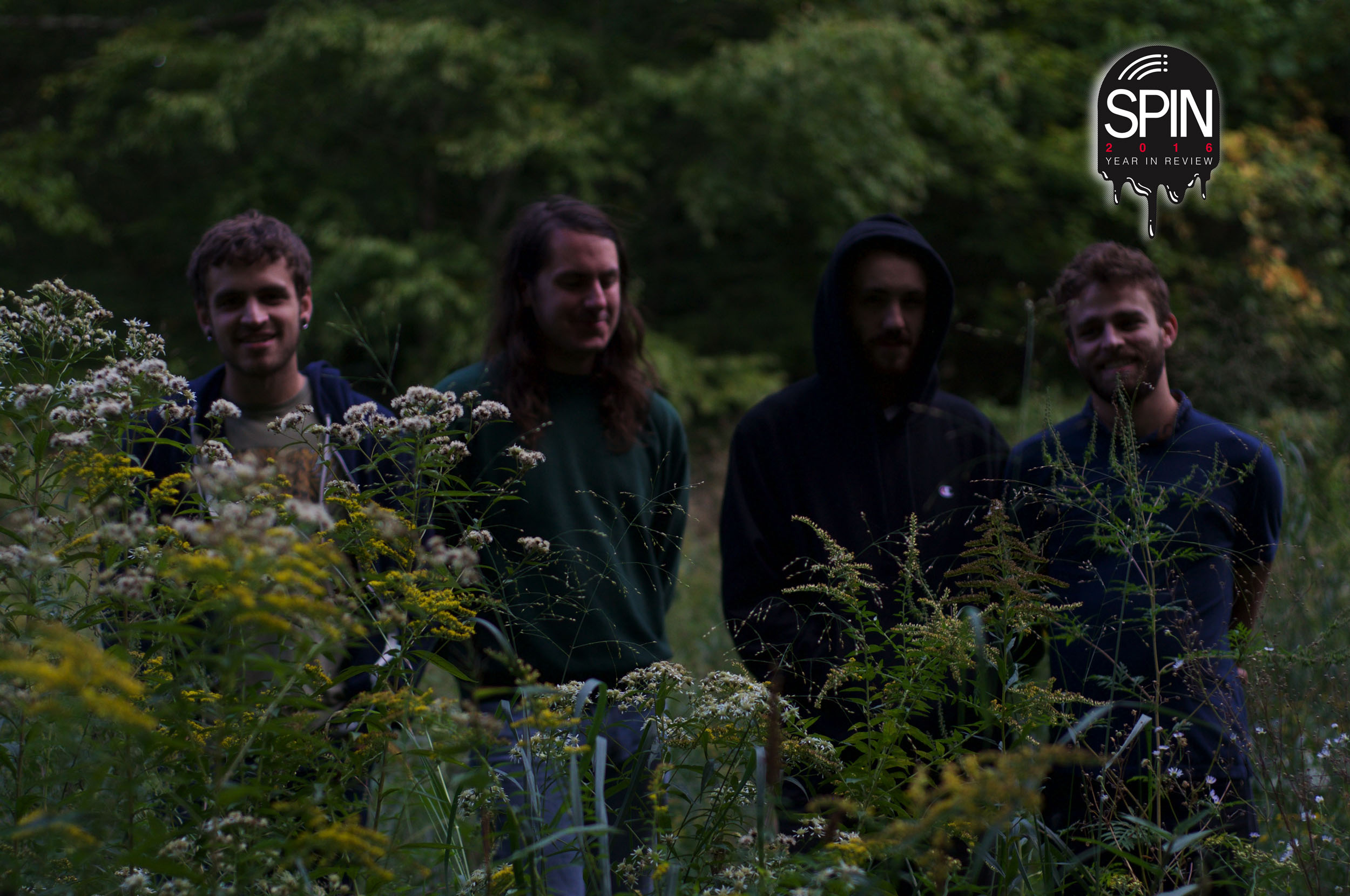Bands who were already uncomfortable with “emo” were branded with an even more derogatory term in 2016: “hippies.” Modern Baseball grew their hair long; Evan Weiss workshopped Into It. Over It.’s Standards in a Vermont cabin. Nearly every band of import advocated for self-care, positivity and radical community. Topshelf, Run For Cover, Tiny Engines and Father/Daughter were among the first labels to donate proceeds to progressive causes after the election of Donald Trump.
And yeah, weed was tight too, as the scene found smokespeople in Sorority Noise’s Cameron Boucher and JANK, who released a brilliant LP and EP before burning out under sketchy circumstances. Or, hell … just look at the lush, verdant album covers that unified From Indian Lakes’ blushing makeout opus Everything Feels Better Now, the eye-catching clarity of Joyce Manor’s Cody, the freak flag proudly waved on the Hotelier’s Goodness. Judging by the shot gracing 2017’s first crucial release, Sinai Vessel’s captivating Brokenlegged, the future’s still in wide open spaces. Emo went green in 2016, all of it signifying a sound and scene that was in full bloom—and that the so-called “emo revival” was buried underneath.
Not that people stopped using the term. It’ll always describe a certain set of stylistic tics or a cluster of festivals, publications and imprints. But “emo” felt ambient this year—the label was applicable to seemingly every form of guitar-based indie rock outside of the NPR-friendly winner’s circle occupied by the likes of Angel Olsen, Parquet Courts or Whitney. Emo encompassed Touche Amore’s Stage Four, a blistering memorial service that strove for dignity in the face of death, as well as PUP haplessly suffering every indignity of life on The Dream is Over. It stuck to Jeff Rosenstock’s brilliant, prophetic punk opera about urban decline as well as Pkew Pkew Pkew’s beer-bonging self-titled rager. There were traces in Crying’s electro-prog, the rustic and bookish charm of Pinegrove’s Cardinal and the slick depressiveness of Balance and Composure. It could be applied to the dumbstruck mash notes of Hurry and Look Mexico’s quizzical take on cubicle life, or found in the mordant slowcore of Peaer and the screamo primalism of Old Gray and Mannequin Pussy.
Interestingly, verbose and anthemic veterans Cymbals Eat Guitars and Los Campesinos! were grandfathered into the genre, having once been the beneficiaries of indie rock buzz and now best known as being painfully outside the zeitgeist. As if to make his critics hate him even more, the 1975’s Matt Healy repped old school and new-school alike, telling a northern Kentucky crowd, “I miss the emo of it all, Newport” at a recent show. Hell, there was even room for the mainstream indie artists who “won” 2016 by the Patrick Stickles definition of the concept: Mitski’s breakthrough LP was named after a Simpsons gag, and SPIN’s review of Puberty 2 reconfigured emo so she would be its definitive act. And while Car Seat Headrest was compared to every canonical 90s indie act except for maybe Stereolab, the guy makes logorrheic, discursive and horn-filled 7-minute songs that painstakingly detail his self-loathing. He’s not slanted and enchanted so much as lifted.
To a degree, this was everything that the trendpieces of 2013 and 2014 hoped for—a post-emo era where these bands could share indie’s rock center lane, as opposed to the previous post-emo era of 2002-2004, when the Get Up Kids, Promise Ring and Saves the Day (not to mention actual splinter or post– projects the Fire Theft, the Jealous Sound and Hey Mercedes) tried to merge and got run the fuck off the road, alienating older fans and failing to reach new ones in equal measure. Likely aware of the precarious position once faced by the Promise Ring, Get Up Kids, Saves the Day and the condescension with which this genre is still discussed, most emo coverage—SPIN’s included—tended to talk in coded or abstract language about the potential for these bands to win over the “arms-crossed” demographic. Surely, there’s something pleasurably quixotic about wanting music whose performance and enjoyment signifies a certain kind of abnormal intensity translating to the most casual of listeners—especially at a time when marquee festival acts like Real Estate, Mac DeMarco and the War on Drugs seem designed to serve as background music for casual beer sipping and new ones are praised for sounding like a watery macrobrew. Or, it just serves as the easiest and correct rejoinder to the idea that indie rock is dead and/or failing to connect with younger audiences.
All of the positive energy led to small breakthroughs in 2016: By December, Standards, Goodness, The Dream is Over and Cardinal were scattered across year-end lists that still made indie rock a priority, while only the most joyless scolds held it against Joyce Manor, Touche Amore and Modern Baseball for making their slickest albums yet. But the old walls still stood: Much was made of the Hotelier playing an afternoon slot at Pitchfork Music Festival, but to put it in perspective, that’s something Woods has done three times in the past five years. Meanwhile, the lineup for Wrecking Ball ATL represented the ultimate post-emo dream, where the reunited Rainer Maria, Hey Mercedes, Motion City Soundtrack and Thursday were viewed as equals to Dinosaur Jr. and L7 … but ticket sales were reportedly sluggish. Most of the exciting package tours of the past year—Modern Baseball with Joyce Manor, the Hotelier with Joyce Manor, Foxing with Balance and Composure, Crying and the Hotelier, Into It. Over It. and Pinegrove and TWIABP, Run For Cover’s Something in the Way Festival—felt like permutations of the same lineups we’ve been seeing together for the entire decade.
While the kind of accolades granted to emo’s A-listers were unimaginable even five years ago, it often came at the cost of the breadth that was necessary during the earlier days of pure scene reportage. We weren’t lacking for new talent: Jouska and Fox Wound made striking entrees that consolidated the anxious post-rock and ambient experimentation of Appleseed Cast and Aereogramme’s entire careers into one album. Sweden’s I Love Your Lifestyle might actually be the first emo revival revival band, adding a more refined sense of melody and humor to the influential late-00s works of Algernon Cadwallader and Snowing.
Broken World Media, the label run by D. Nicole Shanholtzer, formerly of the World is a Beautiful Place and I Am No Longer Afraid to Die, put on an inspiring DIY festival and released a wealth of ear-turning, genre-confounding albums. Posture & the Grizzly and For Everest filtered contemporary identity politics through the Hot Topic-stylized sound of blink-182 and Paramore, while Strange Ranger’s (fka Sioux Falls) Rot Forever, was 2016’s most ambitious debut of classicist indie—one that finds space for Midwestern emo and suburban pop-punk alongside Modest Mouse and Pavement. Emo even studied abroad with the likes of SPORT, tricot and Chinese Football, who’d be the 22 Savage of the genre if they weren’t actually great.
But perhaps the sound and style of fourth-wave emo had become too familiar; it can be utterly exhausting sorting through the hundreds of bands trying to sound like a long-lost Kinsella or Crutchfield sibling, even in the hopes of finding a rallying point of a debut a like Whenever, If Ever or The Albatross. Perhaps that’ll come next year. No one would’ve guessed that the same bands responsible for wobbly debuts like Sports or Grow Up, Dude or especially It Never Goes Out could envision them as innovators mere years later.
Certainly no one foresaw a Massachusetts pop-punk outfit named after an Ataris song making genre-defining masterpieces twice, the second time with a “Taoist love record.” While Home Like NoPlace is There has been heralded as the peak of fourth-wave emo, the Hotelier’s Goodness represents a riskier and thus more rewarding undertaking. While they’ve opened for scene kingpins like Joyce Manor, PUP and Title Fight in the past year, when given the chance, the Hotelier align themselves with bands from the Epoch or Orchid Tapes, scenes that are adjacent to what’s typically considered “emo” but rarely face the same prejudice. Home had context in which it could be easily understood: at times, it sounded like the Weakerthans, Thursday or Saves the Day and dealt in time-honored topics of suicide, depression and drug abuse. You could start a pit to “Life in Drag” even if it went against everything the song spoke about, or appreciate “Housebroken” on some kind of metaphorical level without knowing it was an anti-cop screed inspired by Malcolm X.
Some of Goodness’ more challenging aspects were obvious beyond the album cover: Holden calling it a “Taoist love record” in the first place, telling fans to tune out music writers, releasing a six-minute song as the first single, beginning the record with a spoken word piece. Look, the audience for this stuff skews young and earnest and idealistic, so it doesn’t take much to be accused of betrayal—the cover of Goodness caused maybe a fraction of the backlash as Title Fight going shoegaze or Saves the Day trying to sound like the Beatles and Elliott Smith.
But beyond challenging fans sonically and visually (to put it mildly), the Hotelier put themselves on the line politically, working out their evolving anarcho-punk credo in real time: “I don’t know” was the album’s most frequently used phrase. It’s a lot harder to express what you stand for rather than what you stand against, and on Home, the Hotelier were reactionary, against overwhelming power structures and societal institutions that can only fail the emotionally and economically unstable. They fought passionately, but futilely. On Goodness, the structures and resistance are gone and the deeper one gets into Holden’s abstract lyricism, the more the album cover becomes a design for living: It’s the embodiment of Holden’s complex anarchic principles, manifested as midlife rebirth, community and openness, criticism or commercialism or mainstream acceptance be damned. Emo didn’t just level up in 2016; it gave us transcendence, too.





